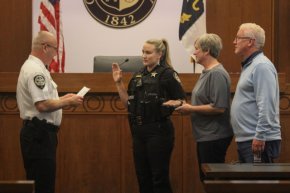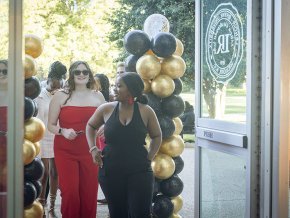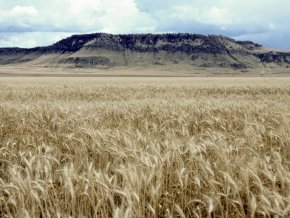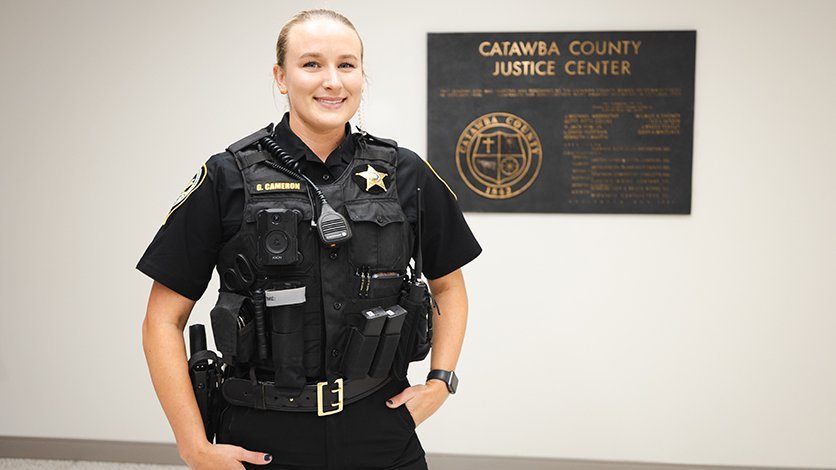
Problem-solving from the soccer field to the sheriff’s office
For Grayson Cameron M.A.’22, working as a deputy sheriff for Catawba County, North Carolina means the pace of her day can go from zero to 100 at a moment’s notice. It only takes one radio call to change everything.

“Working in law enforcement isn’t what your average person thinks. It's unlike any other job, in a good way,” Cameron shared. “I am a problem solver. I like meeting new people, talking to them, responding and finding solutions. That’s what we do every day. I grew up in Hickory, in Catawba County, and I feel like I’m learning something new about this area every day.”
As an undergraduate at North Carolina State University, Cameron played on the women’s soccer team and majored in criminal justice as a practical outlet for her interests in psychology and sociology. When she graduated in 2020, the COVID-19 pandemic had extended her playing eligibility by two years. Then former women’s soccer head coach Gary Higgins reached out with an opportunity for her to play for LR and earn a master’s degree.
“I said yes. It was an easy decision,” said Cameron. “My undergrad was a great program, but it focused on the abstract. At LR we were oriented toward how to apply what we were learning to the real world. I could relate most of my master’s courses to this job, and I still do.”
On the soccer field, Cameron further honed the skill sets she uses every day when interacting with the public.
“Playing the position of goalkeeper, you see the whole field, and you have to be a leader, communicate and make decisions at a snap of the fingers,” Cameron explained. “When I’m on a call, it’s similar. You have to make good decisions with very little time to process. The people I’m seeing are looking to me to lead, to solve problems quickly, all while juggling a constant input of information.”
Cameron completed the M.A. in criminal justice leadership at LR in 2022 and considered potential career paths with the North Carolina State Bureau of Investigation, the U.S. Marshals Service or the Drug Enforcement Administration (DEA). A few months after graduation she began training to join the Catawba County Sheriff’s Office.
Not all heroes wear capes. As a Catawba County Sheriff's Office deputy, former LR women's soccer goalkeeper Grayson Cameron has gone from protecting the net to protecting the people of Catawba County.
“I had the other options for my educational level. I was leaning toward the DEA and talked to a few task force officers out of Charlotte. I decided I needed more experience to really learn what it takes to do this job on the community level before looking at the state or federal level,” Cameron shared.
With a year of training under her belt, Cameron has been patrolling on her own as a deputy sheriff for a few months and leaving a strong impression on her colleagues and superiors.
“We were excited to recruit Cameron. She’s had a really successful athletic career and academic career, and she has exceeded expectations since joining the department,” said Chief Deputy Brian Kelly. “She could have applied almost anywhere, but she’s giving back to her community here in Catawba County.”
Kelly predicts Cameron’s credentials will propel her career quickly, whether that means moving into the narcotics or criminal investigations divisions within the sheriff's office or moving on to the state or federal level — where she could become a valuable contact.
Cameron also recognizes the experience she is accumulating now will open up even more options for her. “In my degree program, a lot of us ended up in a career path we didn’t predict at first. One of us decided to work in crime statistics, another wanted to work as a clerk with the sheriff’s office. Whatever you want to do, there will be a job in this field if it’s what you’re passionate about.”

The revamped 2024 Student Life Awards gave students "A Night to Remember" with recognition and celebration of the joys of being a Bear.
View More
Susan McArver, Ph.D., took a deep dive into the role of the church behind the history of colonization and domination over Indigenous peoples in the Americas during her fall Explore Course, “The Land and its Inhabitants.”
View More